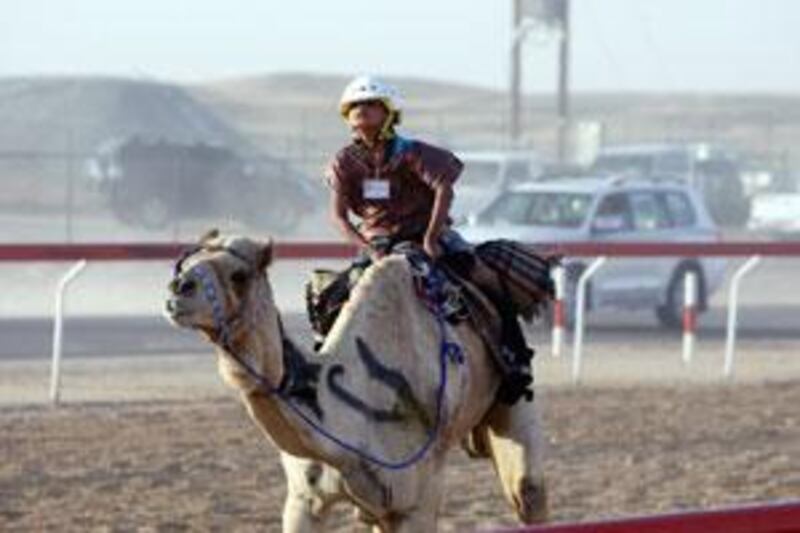ABU DHABI // Children as young as 10 who raced camels during a cultural festival in Sweihan last month were from the UAE and competed with their parents' permission and encouragement, said the acting director of the Naturalisation and Residency Department.
"They are all Emiratis," Maj Gen Nasser al Minhali said yesterday, "and there is no illicit case of camel jockeys." Maj Gen al Minhali was responding to claims by a British charity that the children were South Asian and had been "forced" to take part in the races. Anti-Slavery International (ASI) said the event flouted a UAE ban on using children jockeys under 18, one that was passed in 2002 and enforced from 2005 when the country began using robot jockeys. The Government then worked with Unicef to repatriate and compensate thousands of children involved in the sport. Most of them were under 10, brought in from countries such as Pakistan, Bangledesh, Sudan and Mauritania for their light weight and small size.
ASI, which has been working on the issue since 2002, sent a photographer and had several observers at the site on February 9, watching 12 races and interviewing some of the young participants. Catherine Turner, the organisation's child labour expert, said a few of the children appeared to be Sudanese while others seemed to be South Asian and spoke languages including Bengali, Urdu and Hindi. Not true, said Gen al Minhali, who called the report "flawed".
"There are Emiratis over 10 years of age who participate once or twice a year in the presence of their parents and the supervision of police to ensure they are safe," he said. "It's simple, it is like going to a club. Children go to all kinds of clubs to practise different sports." His comments were echoed in a statement released by the UAE Embassy in London yesterday: "The UAE reiterates that it considers the use of underage children for commercial camel racing to be exploitative. The UAE banned the use of child jockeys in commercial camel racing in 2002 and is committed to enforcing that ban.
"However, it remains lawful for Emirati children to ride camels and to take part in some traditional amateur events. The [Sweihan] festival is equivalent to a British country show and includes bi-annual camel races for different age groups." Officials who spoke with ASI at the event said "soft" sand was used and the race length was reduced from 12 kilometres to three to make it safer. But that still does not make it "acceptable" to put a child on a camel that can race at up to 50km an hour, Mrs Turner said.
"The speeds are still very fast, they can still fall off," she said. Gen al Minhali also denied there were any children injured in the event, despite one of ASI's photographs that showed a child on the ground underneath a camel. "The police were there and no hospital recorded any injuries," he said. A team from The National that attended the race spoke to several of the children involved - all of whom wore special badges that identified them as Emirati.
One of the participants, Hussein al Khateri, 13, said he was looking forward to climbing on his designated camel. "The day you win a race, you feel happy and relaxed," he said. The festival and its races, which are organised by the Emirates Heritage Club, have not replaced human jockeys with remote-controlled robots, so that young Emiratis can get a taste of how their grandfathers felt. The races are strictly for amateurs, with children from the age of 10 allowed to participate provided their parents approve and are present.
Emirati men up to age 60 also competed for prizes including a Toyota Land Cruiser and a gold sword. For several years the UAE sent delegations to visit the four countries involved in trafficking of child jockeys, launching integration projects in their communities. After years of criticism of the practice by international organisations and human rights groups, the country finished compensating former Pakistani and Sudanese camel jockeys last year.
"As for the camel jockeys, there is no single case in the country," said Gen al Minhali. "We closed the case a long time ago and all children are now in their countries, no one is here." * With additional reporting by Associated Press and Lynne al Nahhas






